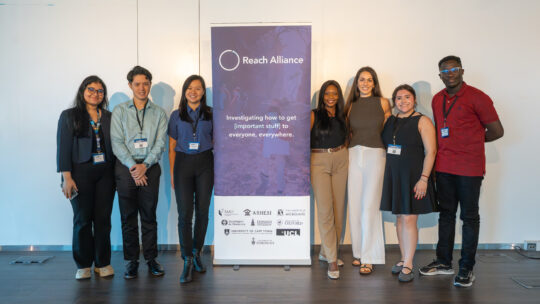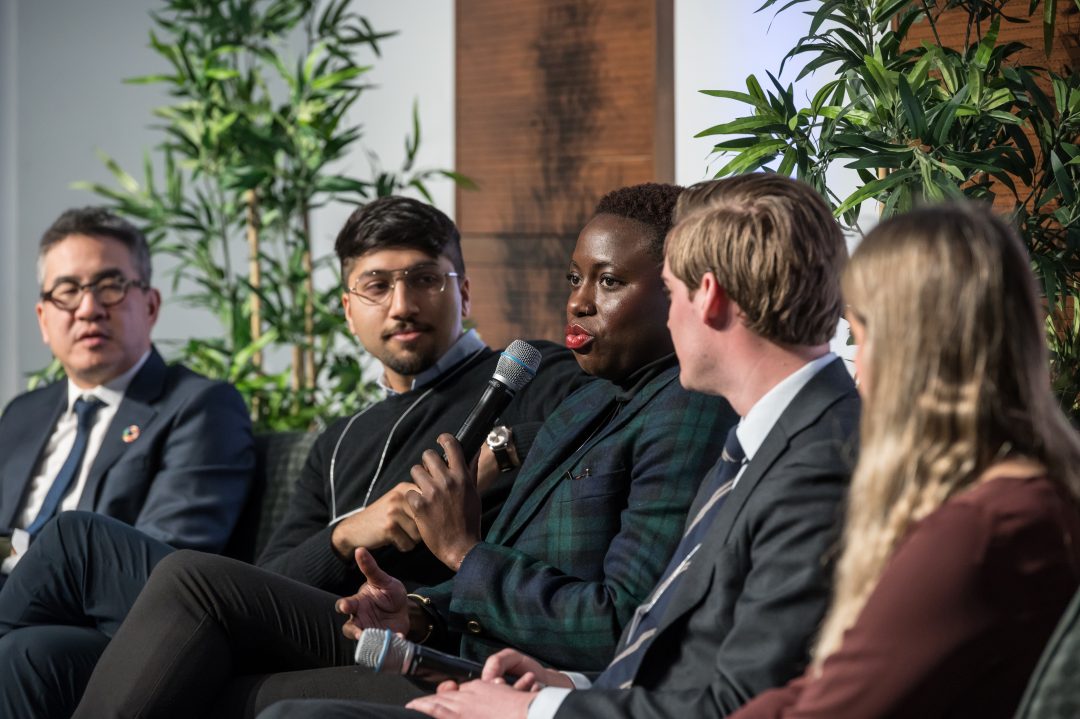2021 Reach Symposium
In the wake of the COVID-19 pandemic, global poverty and inequality are on the rise. Given these challenges, it would be easy to say that we don’t have what it takes to reach the Sustainable Development Goals (SDGs).
But what this last year has shown us is that the imperative to reach hard-to-reach populations has never been greater. This year’s Reach symposium is more important than ever.
“The imperatives of equity and inclusion, illuminated by the COVID-19 pandemic and the Black Lives Matter movement, illustrate the necessity of forging new partnerships across sectors, and doubling down to reach the hardest to reach populations,” said Joseph Wong, Reach founder, University of Toronto vice-president, international, and Roz and Ralph Halbert Professor of Innovation. “This is the opportunity for partners from across sectors, to come together and to be innovative to think of new models to reset our mindset.”
Reach Symposium is about actionable research insights
The Reach Symposium will be hosted virtually on April 29-30, 2021 and will yield an action plan based on Reach research insights and cross-sector discussions throughout the event.
The Symposium will feature the case studies that were published in the past year. The cases touch on 11 of the 17 SDGs and highlight actionable insights from India, Kenya, Rwanda, Guinea, Mexico and Canada. This year marks the first Canadian case study published by the Reach Alliance and sets the stage, we hope, for more to come.
Reach’s work has progressed steadily over the past year. That nine cases launched — the most ever by the Reach Alliance in a one-year period — amid a global pandemic is a testament to the vision, ambition and tenacity of the exceptional student leaders and faculty mentors who participate in the initiative.
“When fieldwork was cancelled due to the pandemic, we had to modify our entire case study, down to the research question,” said Ayushi Thakur, Reach researcher on the India – women’s police station team. “It was a challenging process, but what kept us going was the knowledge that our research would contribute to a greater understanding of initiatives that work —and don’t work — in eradicating violence against women.”
Reach Symposium is about catalyzing impact
The symposium’s keynote address will be delivered by Marla Blow, the incoming president and chief operating officer of the Skoll Foundation. Skoll catalyzes transformational social change by working with social entrepreneurs and innovators who advance bold and equitable solutions to the world’s most pressing problems.
“This year’s symposium will yield an action plan focused on reaching the hardest to reach, and we’re excited to welcome leading thinkers and practitioners from around the world, driving change across sectors,” said Marin MacLeod, Reach Alliance Executive Director. “Marla is an experienced leader in both the public and private sectors. Her vision and commitment to impact is inspiring, and we’re thrilled that she is part of the 2021 Reach Symposium program.”
The symposium will prompt attendees to reflect on how we can focus on a movement of sustained leadership and action in the wake of the global pandemic. How can we build momentum toward achieving the Sustainable Development Goals by 2030? How can we seize the moment to reflect on how to build a more inclusive, equitable, sustainable future, with the views and voices of the hardest to reach at the centre?
Reach Symposium is about growth, evolution and partnerships
This year’s symposium will emphasize the centrality of equity, diversity and inclusion to the work of the Reach Alliance. This past year, Reach undertook a consultative process with researchers, faculty, alumni and partners that resulted in the creation of an Equity, Diversity and Inclusion Charter.
Wisdom Tettey, University of Toronto vice-president and principal of U of T Scarborough, and a leader of the Scarborough National Charter on Anti-Black Racism and Black Inclusion in Canadian Higher Education, will deliver the symposium’s opening remarks, framing the two-day conversation and building on the principles articulated in the charter.
“Given our commitment at Reach to reaching those who are the most marginalized, it is imperative that equity, diversity and inclusion be an integral part of who we are, what we do, and how we do it,” said Wong.
“Our goal, by way of these commitments and principles, is to set the Reach Alliance apart as a leader and as a prominent hub of inclusive knowledge production, creativity and innovation,” continued MacLeod. “Our Equity, Diversity & Inclusion Charter will support Reach to challenge the status quo and to listen, think and act intentionally when it comes to supporting the creation of an exceptional and diverse network of partners around the world.”
The charter – a living document – reflects the realities experienced by the Reach community and Reach’s commitment to removing systemic barriers and championing inclusionary practices.
Building the Reach Alliance
At the 2020 Symposium, we announced the launch of the Reach Alliance – building on the initiative founded at the University of Toronto – which will scale the model to six select universities around the globe. At the 2021 Symposium, we look forward to announcing our first academic partnerships.
“Reach engages top students, equipping the next generation of leaders, to produce actionable insights and catalyzes impact through our institutional partners,” continued MacLeod. “As the Reach Alliance scales around the world, we’re looking forward to engaging in these important conversations about how to accelerate achievement of the Sustainable Development Goals.”

